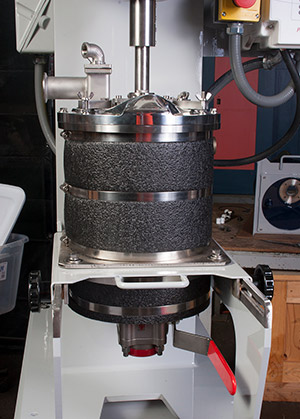
Cryogenic grinding – which cools materials to embrittle them and improve their processabiilty – provides important advantages over grinding at ambient temperatures, particularly for materials that are too soft or too heat sensitive to be easily milled under routine conditions.
These advantages include:
- Increased production rates
- Enhanced product quality
- Greater uniformity in particle size distribution
- Higher yields of particles in the target range
The introduction of lower temperatures during cryomilling curbs recrystallization and embrittles materials so they can be fractured more easily with mechanical milling.
Cryogenic grinding is often performed in impact mills and hammer mills, but the use of an internally agitated ball mill, like an Attritor, can provide additional benefits.
Attritors can generally grind to finer size particle size range than impact or hammer mills by combining the advantages of cryogenic temperatures with both impact and shear forces inherent to high energy internally agitated ball mills.
Cryogenic grinding is most effective when the product is sprayed with liquid nitrogen as it is being conveyed and introduced into the Attritor.
An additional benefit of cryogenic milling in an internally agitated ball mill is the ability to fully immerse the product in liquid nitrogen during milling. The level of liquid nitrogen in the milling chamber can be maintained via a thermocouple and liquid nitrogen flow controller system.
Cryogenic milling is used for a wide range of materials ranging from organic materials to plastics, polymers, rubbers and metal powders.
